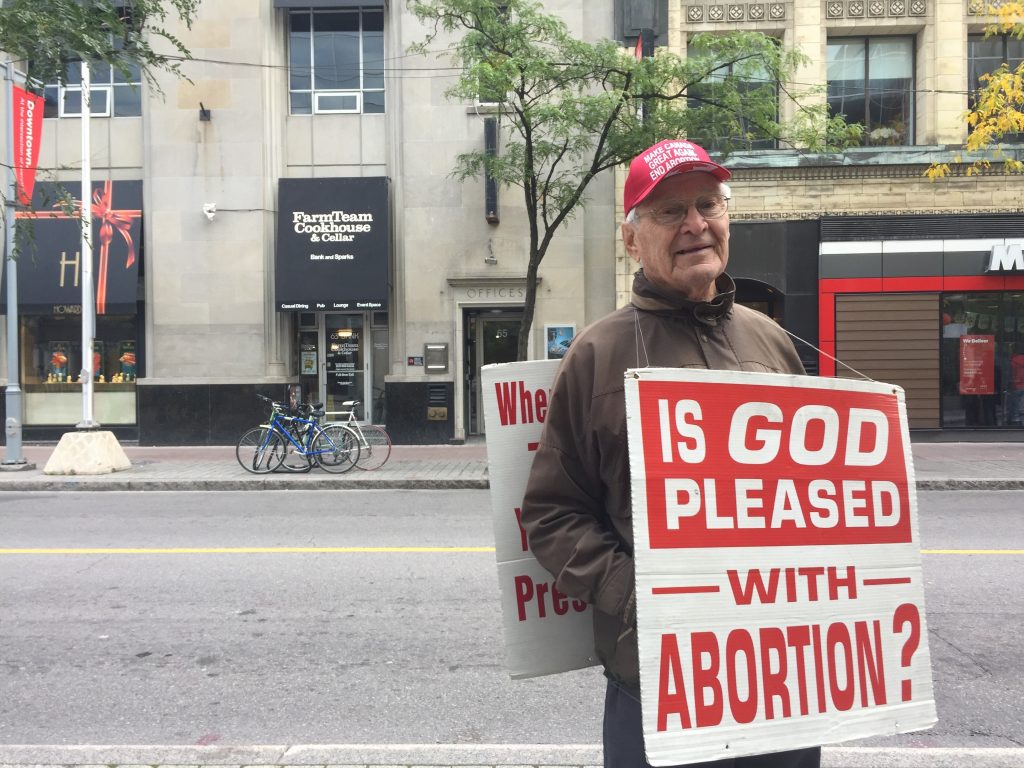Proposed bill to protect abortion clinics from protesters
By Jordana Colomby
Paul Charron has been spreading his pro-life messages across from the downtown Morgentaler Clinic on Bank Street for 12 years. But a proposed bill creating safety zones around abortion clinics and other abortion service providers could put an end to Charron’s controversial protests.
If the bill passes, it would mean that all freestanding clinics in Ontario will automatically receive a 50-metre safety buffer, which can be extended to 150 metres under an application process. The bill also creates safety zones around homes and workplaces of health-care professionals who provide abortion services.
Attorney General Yasir Naqvi introduced the bill on Oct. 4. “The idea is simple,” the Ottawa Centre MPP said in his speech. “Women should have free access – easy access – to these clinics without somebody stopping them, without somebody subjecting them to imagery that could be very traumatic and disturbing for the person … or as we saw in my hometown in Ottawa, a woman was spat on, which is assault.”
Being the only freestanding abortion clinic in Ottawa, the Morgentaler Clinic has protesters such as Charron around nearly every day.
He said he does not agree with the bill, but added that he will stop protesting altogether if it passes.
“We should have the liberty of free speech. It’s being taken away from us with this injunction,” said Charron. “But I’m 91 years old … I’m too old to fight.”
The bill would not prevent people from demonstrating outside of the “bubble-zones,” but Charron said other locations would hardly be effective.
Johanne Brownrigg, who handles federal government relations for the anti-abortion Campaign Life Coalition, said pushing protesters farther away is short-sighted. But she said other protesters, unlike Charron, will not give up.
“It doesn’t serve Ottawa to have pro-lifers protest 100 metres way from an abortion clinic, perhaps outside a really nice patio or a corner store. They have nothing to do with what’s going on at 65 Bank,” said Brownrigg. “But pro-lifers aren’t going to just stop. They’ll just stand 100 metres away and witness there.”
The coalition lobbies for pro-life policies in Canada and focuses on education campaigns rather than protests.
Brownrigg said acts of violence and intimidation outside abortion clinics do not reflect the pro-life movement as a whole or the principles of the Campaign Life Coalition. If someone does cross the line, she said she believes there are proper laws in place.
Catherine Macnab, the executive director of Planned Parenthood Ottawa, said even though protesters might think they are being peaceful, they are still intimidating.
“There’s nowhere else that people accept harassment and intimidation for people walking into a building,” said Macnab. “We have people who will call and ask where can they get an abortion that they don’t have to face protesters.”
Tensions arose recently after Naqvi announced he would not be fast-tracking the bill despite urging from the opposition to do so.
Although there was some criticism about that decision from the public, Macnab said she understands that Naqvi wants to ensure the bill is carefully reviewed to ensure it will withstand legal challenges. She added that it would be great if the bill was passed sooner, but acknowledged that it takes time to review new legislation.
Macnab said that while Ontario is not the first province to create safe zones, it is a unique situation because Ontario has also approved the abortion pill.
With the legalization of medical abortions, women can access services at participating pharmacies instead of strictly at clinics. Any hospital, clinic or pharmacy distributing the pill would also be able to apply for a safe zone.

